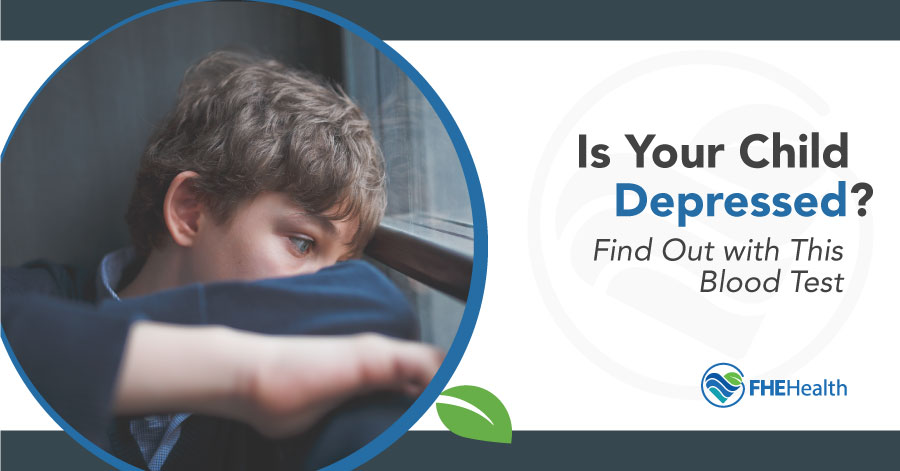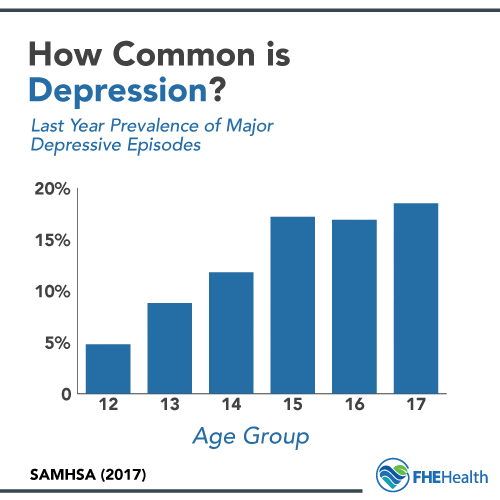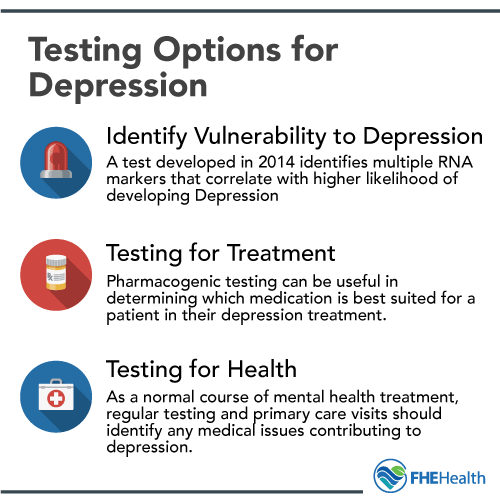
Depression is a serious issue in the United States. In 2015, over 18 million adults experienced at least one depressive episode, and around 5% of children are similarly affected. Living with depression can be devastating, with symptoms that include a disinterest in hobbies and pleasurable activities, a lack of self-care, an inability to focus in school, low grades, low motivation at work, failing job performance and even suicidal ideations. In combination, this can create many problems for those who are depressed and strongly interfere with normal life in semi-permanent or far-reaching ways.
However, there has historically been no easy way to test for depression. Diagnoses have long been based on symptoms, and this can be problematic. Many depression symptoms, like trouble with self-care and a general disinterest in life, can be hard to identify as depression, particularly when the person in question doesn’t feel particularly sad or blue. Due to this, many people go undiagnosed or don’t show the proper symptoms to warrant a diagnosis, despite the reality of the situation.
New blood tests are now changing this. As doctors identify different biomarkers that can indicate depression or, sometimes, more importantly, exclude other potential disorders, a new horizon is expanding in depression diagnosis. For parents worried about symptoms in their children, this kind of test may be extremely beneficial in working towards an effective management plan.
Can Depression Be Diagnosed With a Blood Test?
 The short answer? Not exactly. Or at least, not as clearly as you’d hope.
The short answer? Not exactly. Or at least, not as clearly as you’d hope.
There are several different ways to use blood testing in the diagnosis and treatment of major depressive disorder, but this doesn’t mean that blood tests provide a definitive answer or that there aren’t behavioral aspects that should be taken into consideration. Instead, blood tests should be used as a part of a larger process.
Blood tests can be applied in a few different ways. Some tests sample biological material in the blood to determine whether depression may be a likely condition. Other tests screen for things like anemia to rule out another cause of symptoms like lethargy and fatigue. Additional tests look for blood profiles that may indicate the efficacy of specific courses of treatment.
Using biological markers to enhance the process of a depression diagnosis certainly opens new doors in creating proper treatment plans and ensuring patients in need get the help they deserve.
How to Test for Depression
The first blood test designed to diagnose depression was released in 2014 by scientists at Northwestern University.
This test examines characteristics of RNA, a nucleic acid that serves as a messenger for DNA cells. By examining nine RNA markers, scientists are able to test for certain indicators that may point to depression. This test was developed by taking blood samples from both depressed and healthy subjects, including those who had been taking antidepressants yet were still showing symptoms. Doctors in the study noted nine distinct markers that occurred in far higher quantities in those who were depressed than those who were not.
The sample size for this test was fairly small — 64 people were tested, 32 depressed and 32 without depression. However, the correlation was strong, indicating that this test could be applied to a larger population with similar results. As such, this sort of testing is now being incorporated into depression diagnoses across the country in major psychiatric care centers. It is important to note that this test was performed on adults, not children, but there is no reason to believe that results would differ significantly in teens or young adults facing depression.
This particular test claims to be able to identify vulnerability to depression as well. The blood concentration of three of the RNA markers remained changed even for those who went into remission. Researchers, therefore, postulate that these markers could be indicative of those who may develop depression in the future.
It is important to note that not every cause of depression can be identified in the blood. While depression can be genetic or biological in origin, it’s not always. Depression can be highly circumstantial, with some people experiencing symptoms due to things like job loss, marital struggles or financial problems. These kinds of things may not be notable in blood, which is why behavioral exams are still critical in the comprehensive process of depression diagnosis. In children, things like bullying, relationship problems, hormonal shifts in puberty or the loss of a friend or family member can all trigger symptoms of depression.
Screening Test to Eliminate Depression
Symptoms of depression, like fatigue, lethargy, trouble finding motivation and physical weakness, can be caused by major depressive disorder but also by several other conditions, including anemia and leukemia. Some doctors prioritize testing for medical conditions before moving on to the treatment of mental health conditions. In some cases, treating the physical condition can alleviate symptoms, but in others, a treatment for depression will be required in conjunction with the treatment of physical symptoms.
Blood Tests for Treatment

The RNA screening test referenced above also can be used in the identification of patients who will respond best to behavioral therapy. In several of the nine markers, levels varied between those who saw benefits from therapy and those who did not, providing an indication of who would be a good candidate for therapy versus medication. While many patients require a combination of both to see lasting progress, the role therapy plays may be able to be better evaluated among children and adults in the future. This may be a particular benefit for parents who are hesitant to start children or teens on medicine without evidence that it would be absolutely necessary.
This RNA screening isn’t the only test that can identify the efficacy of treatment. Researchers are also beginning to use tests that evaluate levels of C-reactive protein, or CRP. CRP is often used as an indicator of inflammation, and some theories connect inflammation in the body or brain with a diagnosis of major depressive disorder. In studying the role of CRP with depression treatment, doctors have noted a difference in CRP levels within the blood and response to various treatments. When CRP levels in the blood are below 1 milligram per liter, treatments using escitalopram without other medications have proven to be effective, while those with higher levels are more likely to respond better to a combination of bupropion and escitalopram.
General Blood Tests and Overall Health
Blood tests are a regular component in physical exams, offering the ability to screen for common medical issues and find warning signs of future disease. Unfortunately, preventive care appointments are frequently neglected, resulting in a lapse in annual blood tests. Many people believe that without symptoms, the likelihood of disease is low. However, this is not the case. Many conditions, like high cholesterol, can’t necessarily be detected without a blood test, leading to the potential for serious complications if testing isn’t done regularly.
For those with an assortment of health ailments, from joint pain to digestive discomfort, blood tests can make a sizable difference in detecting the underlying problem. When these issues are stabilized, overall mood may improve. In fact, doctors have found links between chronic illnesses and depression, indicating that ongoing health problems could be a contributing factor. With regular blood testing, it’s possible to catch the kinds of problems like the development of diabetes that could be contributing to uncomfortable feelings, leading to treatments that may remedy symptoms of depression. This is often less important in children, who are less likely to have chronic health conditions, but may be a factor in cases like pediatric cancer.
Depression is a serious issue in the U.S. and around the world, but innovations in blood testing may be able to streamline diagnosis and treatment in children and adults. With the ability to look for biological markers, like RNA and levels of C-reactive protein, it may be possible for parents to better understand the biology of their children’s depression — and better plan for treatment that will make a difference.
At FHE Health, we are dedicated to making a difference for those living with mental health disorders like depression and anxiety. Our rehabilitation center is intended to provide a brighter future for those with mental illness, offering effective treatments for those facing a wide spectrum of challenges. Please contact us today to learn more.






